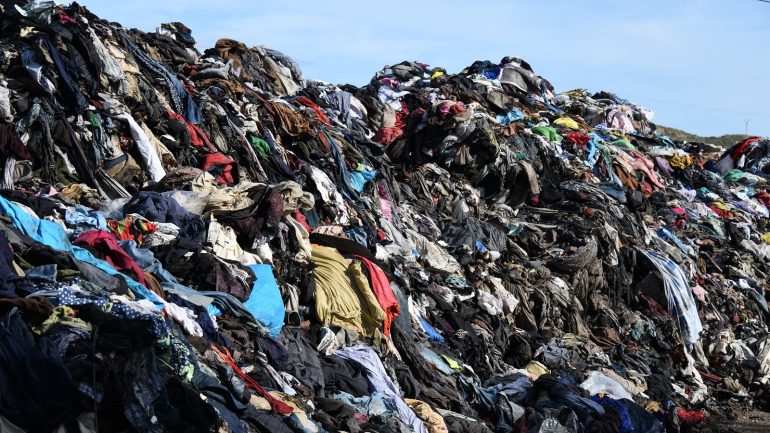Upcycling, where poor quality, discarded clothes are made into desirable products, is becoming more widespread in countries like Kenya.
Social enterprise group Africa Collect Textiles (ACT) employs women at a factory in the Kenyan capital, Nairobi, to create something new out of fashion waste.
There it takes years to decompose, generating the greenhouse gas, methane, and releasing toxic chemicals and dyes into the soil and groundwater.
But ACT aims to be part of the solution.
Operating in both Kenya and Nigeria, it says the problem is that many developing countries lack the infrastructure to dispose of textile waste in an environmentally-friendly way.
ACT has set up collection bins in high traffic areas like malls and universities where people can easily dispose of old clothes.
These are collected and are sorted in the workshop according to their quality and wearability.
“When these clothes reach the landfills, they are either burnt to reduce their volume or they are left to decay. What we do not know is that some of the clothes that are being made right now take almost 200 years to decompose,” says ACT’s communication manager, Nathalie Naina.
“The solution ACT is providing is one that rather provides a zero waste solution, low carbon emissions, but also kick starts a circular ecosystem for textile in the world.”
Many of the products produced by ACT are sold at The Artisanal Gallery in Nairobi, co-founded by Crista Victoria Mehta.
The high-end store is a far cry from the teaming markets where traders do their best to sell off tonnes of discarded textiles, most of it used clothes rejected by other countries.
She says people are becoming more selective in what they buy and they consciously look for items which add value to the local economy without damaging their environment.
“We are able to tell people that this is not just a basket or a carpet but is actually made from jeans material, it immediately invokes a sense of a more conscious buying decision,” she says.
“They suddenly know that if they have footwear or textiles lying in the house, they can come and donate it and it is going to be rebirthed into a beautiful product that others can buy.”
African countries like Kenya often bear the brunt of fast fashion waste.
But the products produced by ACT are not only a testament to the creativity of the seamstresses, but also add value to the local economy without damaging the environment.
“With organisations like ACT, they are trying to put recycling systems, infrastructure in the country so that we can collect these clothes from people,” says Betterman Simidi, founder of Clean Up Kenya.
He says every step towards cleaning the environment should be encouraged.
“We can even resell them just to extend their end of life. But also, we can try and find recycling solutions for this clothing.”
Textile waste is an urgent global problem, with only 12 per cent recycled worldwide, according to fashion sustainability non-profit Ellen MacArthur Foundation.
Even less, only one per cent are cast-off clothes recycled into new garments.
It says this is a global problem which needs global solutions.
In the meantime, ventures like Africa Collect Textiles are doing what they can to tackle the textile waste.
Source: Africa News
Stay informed and ahead of the curve! Follow Africa Update Newspaper on WhatsApp for real-time updates, breaking news, and exclusive content. Don't miss a headline – join now!


